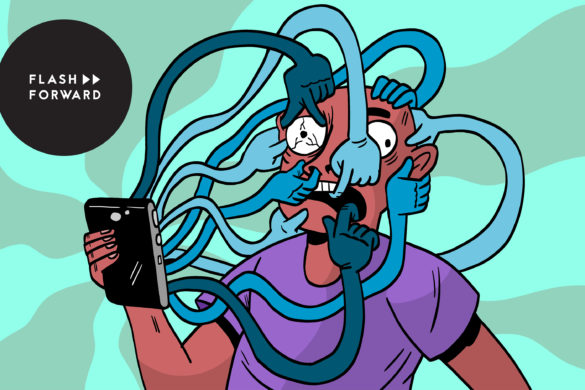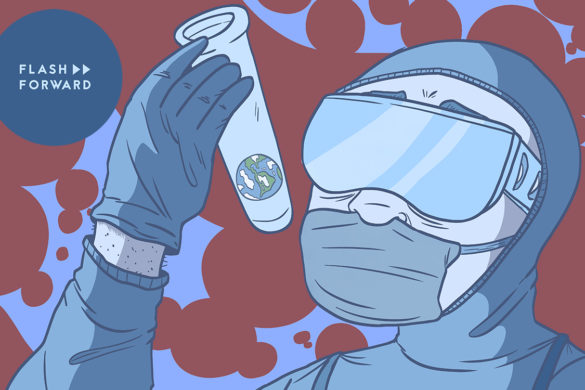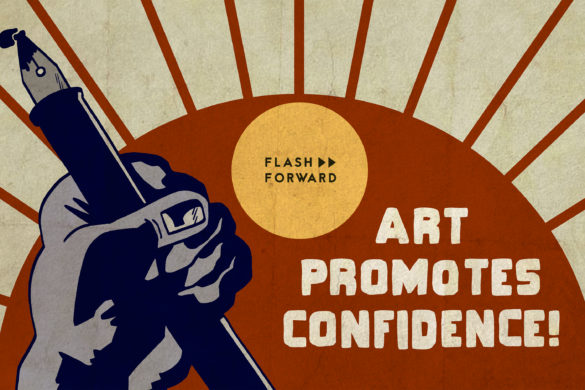Hello! And welcome to SEASON THREE of Flash Forward! I know I’ve been away for a bit, but I’m really excited for this season, I have some really fun futures planned for you. And some scary ones. But also fun ones! I promise, it’s a good mix.
This episode we’re talking birth control: what happens when everybody has 100% control over when they do or don’t have babies?
To find out I called up a bunch of people who know all about the past, present and future of baby making.
Aaron Hamlin explains why male birth control has been so elusive. Haylin Belay explains what is keeping women from gaining access to birth control today. Alexis Madrigal talks about a future in which conception is perfected in the lab. And Elaine Tyler May talks about what we can learn about this future from the history of the birth control pill in America.
Flash Forward is produced by me, Rose Eveleth, and is part of the Boing Boing podcast family. The intro music is by Asura and the outtro music is by Hussalonia. Special thanks to Brent Rose. The episode art is by Matt Lubchansky.
If you want to suggest a future we should take on, send us a note on Twitter, Facebook or by email at info@flashforwardpod.com. We love hearing your ideas! And if you think you’ve spotted one of the little references I’ve hidden in the episode, email us there too. If you’re right, I’ll send you something cool.
And if you want to support the show, there are a few ways you can do that too! We have a Patreon page, where you can donate to the show. But if that’s not in the cards for you, you can head to iTunes and leave us a nice review or just tell your friends about us. Those things really do help.
That’s all for this future, come back next week and we’ll travel to a new one.
▹▹▹▹▹▹▹▹▹▹▹▹▹▹▹▹▹▹▹▹▹▹▹▹▹▹▹▹▹▹▹▹▹▹▹▹▹▹▹▹▹▹▹▹▹▹▹▹▹▹▹▹▹▹▹▹▹▹▹▹▹▹▹▹▹▹
TRANSCRIPT
Rose: Hello! And welcome to SEASON THREE of Flash Forward! I know I’ve been away for a bit, but I’m really excited for this season, I have some really fun futures planned for you. And some scary ones. But also fun ones! I promise, it’s a good mix.
Before we get started I have a couple of points of business! You know that we have great advertisers that support the show and keep it free for you. One of the reasons why advertisers love Flash Forward is that they know the show has amazing listeners. Right now we have a survey that I’d like you to take to help us learn more about our audience. Just go to podsurvey.com/FLASH
The survey will only take 5 minutes. We’re going to ask you some questions about yourself and what you like to buy, but it’s completely anonymous. Your answers help us find advertisers that are well matched to you, your interests, and the show. When you’re finished you can enter a monthly drawing to win a $100 Amazon gift card.
Even if you’ve taken a podcast listener survey before I’d like to ask you to take ours, and help support the show. Don’t forget that you have a chance to win that $100 gift card.
Once again that’s podsurvey-dot-com-slash-FLASH
Thanks for helping me find the best advertisers so that I can keep the show free for you.
ALSO! One quick bit of personal news which is also show news. I got a job! I mean, I had a job before, I was a freelancer, but I got a full time job. I’m now working at ESPN helping them launch 30 for 30 podcasts. If you’re not familiar with 30 for 30, it’s a film series that ESPN does that’s basically long, amazing documentaries about sports. If you saw the recent huge 8 hour documentary OJ: Made in America, you’ve seen a 30 for 30. So I’m now on a brand new team that’s going to be bringing that same longform documentary style to podcasts about where sports intersects with culture, politics and identity.
ANYWAY this is all to say that the show will go on! But it will be monthly instead of every other week, for at least a little while while I try to figure out how to balance making this podcast, and this new full time job.
Oh and for those who skip the outtro or are new to the show, there are hidden references in every episode. Including this one. And if you find those references, and send me an email at info@flashforwardpod.com telling me about it, you get a prize.
OKAY ON WITH THE SHOW!
So… I guess I should do the like, intro thing, for those of you who have no idea what this show is about. Welcome! Flash Forward is a show about the future! Every episode we take on a specific possible, or not so possible future scenario. First, we go to the future to hear what that’s like, and then we come back to now and talk about how it would really go down with a team of experts.
One last caveat about this episode, is that it’s going to include some frank discussion of sex, and sex organs. I know some of you listen with kids, so just letting you know.
Got it? Great. Let’s start this SEASON in the year 2085.
[[Drug Ads]]
Infanex — [rock songs, party music].
Male narrator: After every wild night, comes that same lingering anxiety: was she really on the pill? How can you be sure? For too long you’ve simply had to take her word for it. Now it’s time to take things into your own hands. And with Infanex, you can. Infanex is the first ever birth control for men, and thanks to recent changes in medical coverage, it’s free for all men over the age of 13. You shouldn’t leave something as important as having a baby in someone else’s hands. Get Infanex today.
Bebono — [sweet lady music, kids playing]
Woman narrator: A woman’s body deserves to be pampered. But many birth control methods can wreak havoc both inside and out. So how do you stay responsible without being miserable? Try Bebono, a brand new birth non-hormonal birth control that works in a totally revolutionary way. No more cramps, blood clots, headaches, weight gain, mood changes, missed periods, decreased libido, none of it. Bebono, pamper yourself.
[[PSA]]
Woman’s voice: Hi, I’m Knotly Wade, and I’m here with an important public service announcement. Now that you don’t have to worry about pregnancy, you might think that sex is worry free. But when it comes to sexually transmitted infections, sleeping with one person is like sleeping with many. Science is incredible. Protect yourself, babies aren’t the only risk when it comes to sex.
ROSE: Okay, so this is a future where everybody has access to 100% reliable birth control. You’ve asked for utopias on this show, and I think this is about as close as we’re going to come. I mean, except that later in the show we’ll talk about the ways this can backfire, but, not yet!
Actually, let’s start by talking about the tech part of this future — right now birth control is, honestly, pretty limited.
Haylin Belay: So generally speaking the methods that folks use for birth control fall into one of two categories I guess withdrawal would be the secret third category.
Rose: That’s Haylin Belay.
Haylin: You can call me a writer and sex educator. It’s not it’s really it’s not that hard. It’s just if you have a friend named Lynn and you see her on the street and you’re like “Hey Lynn!“
So generally speaking people prevent pregnancy using barrier methods meaning condoms whether those are external or internal condoms. The withdrawal method or the pull out method the rhythm method which is more about tracking the oblations cycle and then the hormonal methods such as hormonal IUD is oral contraceptives implants and things like that.
Rose: There are also surgical methods for both men and women, some of which are considered permanent, and some of which aren’t. But those more for people who know they want to just cut the whole process off for the long term, whether they never want to have kids, or they want to stop having kids. Most 18 year olds aren’t using vasectomies for birth control.
So, that’s what we have now. And there are lots of ways that those methods of birth control are imperfect. Hormonal birth controls come with a ton of side effects for women, condoms can break, and the withdrawal method isn’t super effective. So what does the future of birth control look like?
For women, there are a couple of things on the horizon, but most of them are improvements on the tech we have now. So, hormonal birth control with fewer side effects. Or, implants that dissolve themselves instead of having to be removed from the body by a doctor.
But you’ll notice that in the setup here I said EVERYBODY has access to birth control. Not just women, but men too. Which brings us to dun dun DUN Male Birth Control.
So, if you’ve been following the science of birth control for a while, you probably just rolled your eyes. And I get it. Because male birth control has been THE NEXT BIG THING for a long time now, and yet it never seems to actually happen.
Haylin: Yeah I mean I don’t I don’t want to sound pessimistic but a lot of the things that I have heard about sound a little bit like…. So there’s the male birth control rate which has been this beautiful fantasy for many years and I feel it pops up in coverage every six to eight months. But I personally have not seen anything that looks even close to coming to market in a realistic way.
Rose: This past week in fact there was a whole lot of press about the reasons why male hormonal birth control hasn’t worked out so far. A recent study found that hormonal birth control is effective in men, just like it is in women, but the researchers actually stopped the study early because the men were reporting side effects like depression. Now, depression is a side effect for female birth control too, in fact a different study recently found that between 20 and 30 percent of women who take birth control experience depression. It’s hard to tease apart correlation and causation here, so as far as I can tell, scientists don’t totally know how much of this is due to the birth control pills themselves or other factors. But they do seem convinced that the birth control is a significant factor in teens developing depression.
But it’s not just this one study, the reason that birth control was even developed for women instead of men was because the researchers believed that men simply wouldn’t accept the side effects. And that’s still true.
Aaron Hamlin: There was a study a while back in Human Reproduction and asked people, asked men within a number of different of countries “would you use a new male contraceptive if it were available? And half of them said yes. Three out of eight of them said maybe, one in eight said no. But what’s interesting about that is when they asked that question they framed it in terms of a hormonal contraceptive. So had they asked that question in a way that was referring to non-hormonal, one would expect that the numbers would be higher and women would say “you know what that’s a good idea.”
Rose: That’s Aaron Hamlin, he’s the executive director at a non-profit called the Male Contraception Initiative. And they’re actually focused on non-hormonal birth control in part because it’s easier to convince men and therefore funders to try methods that don’t mess with hormones.
Aaron: So you might just call us extra cautious.
Rose: So let’s talk about some of these non-hormonal methods that people are working on.
Probably the most well known one is something called Vasalgel. The premise behind Vasalgel is to block a tube called the vas defrens, a tube the sperm need to get through in order to make it into ejaculate. So the idea here is that if you block the sperm from ever getting out of the body they can’t possibly make their way to an egg. The process is a one time procedure that a guy has, and that in theory lasts for a really long time, it just blocks the sperm from ever escaping the body.
Vasalgel is one of those male birth controls that is always “on the horizon” but that never seems to get here. And Aaron says that’s in part because there are still some concerns with the method.
Aaron: So that’s another issue because when you limit the space in which sperm can occupy then you can create some pressure up against the epididymis which can cause some long term issues as far as production down the road.
Rose: Another type of male birth control you might have heard of is something called an anti-Eppin drug. Eppin is a protein that covers the surface of sperm, and anti-Eppin messes up that covering and stops the sperm from being able to swim. But that isn’t in clinical trials yet, so it will take years to find out whether it will ever come to market or not.
Then there’s something called the “clean sheets pill”
Aaron: So the clean sheets still works by relaxing the longitudinal muscles in the vas defrens. So that that tube where the sperm get through that sperm has to get through there somehow propelled somehow. And it’s the muscles in the vas defrens that allows that to happen. And so that still works by relaxing those muscles. And so in effect the the male the man would experience an orgasm but wouldn’t the ejaculate.
Rose: And they call that the clean sheets pill because without semen, it also cuts down the risk of STIs?
Aaron: They call it the clean sheets pill, because, uh
Rose: Oh! [laughs]
Aaron: They’re having fun with it.
Rose: I see, I thought it meant you have a clean bill of health! They’re taking it much more literally!
Aaron: Right
Rose: Okay, alright, alright.
There are other forms of male birth control out there, like genetic techniques that target the genes that make sperm to begin with, but those are far more preliminary than these ones.
And as much as male birth control has kind of become, I guess almost the contraceptive version of the “where’s my flying car” joke, Aaron still has faith.
Aaron: Any of these things can fail at any time, that’s just the nature of pharmaceutical drug development. There’s been this rhetoric a lot, with, well when is the next male contraceptive going to get here? And the answer is always, it’s ten years away. And kind of the rationale for that answer is that from the early stage of development to that endpoint it’s hovering around ten years. Right now there are issues in terms of funding, and it looks like we may be able to address those. So I think over the course of 20 years it would not be surprising at all to see one of these hit the market.
Rose: So right now there’s a lot in between people and perfect birth control. But what if we did get to this future? What would that look like? When we come back, we’ll dig into that. But first, a quick word from our sponsors.
[[MUSIC]]
Flash Forward is brought to you in part by Blue Apron. Let’s talk about the future of food for a second. In a ton of science fiction, food becomes these weird pills or like, smoothie things. The rationale is usually that people are too busy to shop and cook, that cooking is inefficient and hard and frustrating, that finding actual ingredients in our future wasteland is impossible, or something like that. Well, Blue Apron may save us from that future, because they make cooking delicious meals easy!
For less than $10 per meal, Blue Apron delivers seasonal recipes along with pre-portioned ingredients to make delicious, home-cooked meals.
Plus, Blue Apron is helping build a better future world beyond just what’s happening in your kitchen. They’ve established partnerships with over 150 local farms, fisheries and ranchers across the US. All their seafood is sourced sustainably, their beef and chicken are raised humanely, and they use regenerative farming practices for produce. And Blue Apron meals can be delievered to 99 percent of the continental US, and 99.5% of food deserts.
Whether it’s Japanese ramen noodles, wild-caught Alaskan salmon or heirloom tomatoes, Blue Apron is bringing you the best. November’s meals include Lemongrass Roasted Port with Romanesco Cauliflower & Coconut Rice, Pan-Seared Chicken with Roasted Fall Vegetables & Butter-Caper Sauce, AND Spicy Lotus Root & Purple Carrot Stir Fry with Sweet Potato Noodles. Every single one of those sounds way better than a future food pill.
Check out this week’s menu and get your first THREE meals FREE—WITH FREE SHIPPING—by going to blueapron.com/flash
You will love how good it feels, and tastes, to create incredible home cooked meals with Blue Apron, so don’t wait!
That’s BLUE APRON DOT COM SLASH FLASH – Blue Apron. A better way to cook.
>>>>
Flash Forward is also brought to you in part by Black Mirror. Listen. I know a ton of you know about this show, and if you don’t, but you like this podcast, you should definitely know about this show. Black Mirror is this incredible show created by Charlie Brooker, that tackles our relationships with technology and how each bright moment of today could possibly go wrong tomorrow. The New Yorker calls it the Twilight Zone for the Digital Age and I think that’s totally spot on.
Each episode is a self-contained story that unfolds with calculated precision, teaching us about its universe while emotionally connecting us to the fate of its characters. Six new episodes just dropped on Netflix, featuring an incredible cast that includes Halt and Catch Fire’s Mackenzie Davis, Roots’ Malachi Kirby, Boardwalk Empire’s Kelly MacDonald and Game of Thrones’ Jerome Flynn just to name a few.
There are six new ones now, but you can also stream season one and two today only on Netflix! And you totally should. And then talk to me about them because I have so many thoughts.
[[MIDROLL]]
Rose: Okay! So this episode so far has been about birth control. But I want to take a quick diversion from preventing babies, which has kind of largely what this conversation has been about, to making them. Because birth CONTROL is, fundamentally, about control. Which I guess is obvious but stick with me here. I think it’s important to think about the flip side of being able to turn off the babymaking process, which is being able to turn it on. And to talk about that, I called up this guy.
Alexis Madrigal: Hey I thought the landline would be better but it’s not. Just just an indication of how far out I am actually
Rose: This is Alexis Madrigal, uh, my former boss,
Alexis: and I am the editor at large at Fusion. [5.7]
Rose: And Alexis has this really interesting story about fertility that, I’m just going to let him tell you.
Alexis: Yeah. Yes. I’ll tell you a little bit of my story which is that you know in my family basically everybody has gotten somebody pregnant or gotten pregnant early like accidentally you know my dad my sister, other people in our immediate family you know like we’re we’re like a fertile group of people or so or so I thought! That’s foreshadowing!
And I you know my wife Sarah and I had gotten married actually here in the Colorado mountains where I’m sitting right now. And we were thinking well now it’s time you know for the baby making part of all this. And you know we were kind of planners and so we thought like well you know what we’ll do is we’ll just like make sure that each of us as you know has standard fertility and you know that way we’re not just like trying for a long time and then realize that you know whatever one of us there’s some issue you know but I honestly I thought there was absolutely nothing wrong with me I was just like oh absolutely. You know I’m just I mean I have so many sperm they don’t even know how to count them all. You know and they’re going to swim they’re like you know they’re going to be like Michael Phelps like to right right down you know to the eggs. So that was my thought at least. And so you know I kind of didn’t really think about it for a while and then you know a couple of months went by and so it was like you know we should really get you know go do this like you know sperm test you know just to just to check things out make sure everything’s cool you know some from our friends have started to get pregnant around us.
So I go into this place. You know it’s like a fertility clinic that happen to be around the corner from us in Berkeley and you know it’s a really weird process you go in and it’s like they have literally like a tiny room off the reception area where they have like stacks of pornography in my little cup for you and you’re just like really? This is weird. Yeah. Like who’s even seen in a million magazine of pornography like since the 1990s you know like this is a bizarre situation you find yourself in and you hear people coming and being like “Hey I’m just checking in for my appointment” and you’re like behind this other side of the door you know it’s very weird.
So you know you sort of have to put semen in the cup you put the woman in the cup you know you put it in a place you know you don’t even have to bring it back outside. It should be even weirder. And then you just kind of like you know put your hand in your pocket and whistle out the door. And I totally forgot about it again, you know for a few weeks and then you know I didn’t really have a primary care physician because you know because millennial I guess. And so that seemed like a guy. And I called him back and you know was like hey you know what happened this test in his office was like oh you know he’s on vacation in Florida for three weeks and I was like right well can you just send me the task so I have it. And they’re like yeah sure.
So you know it’s Friday this is obviously before we had kids. It’s Friday afternoon and after work and I’m taking a nap when my wife walks in to the bedroom and is like hey your sperm test came you know, and she’s kind of like hand it to me and in my glass of rubbing my eyes kind of like with the paper really close to my face looking at it and I’m looking at the sort of first thing which is sort of like overall count of sperm. It wasn’t good but it wasn’t like the worst thing you’d ever seen.
But then you know there’s these other measures that people don’t really think about which are sort of like well how many of your sperm just aren’t fucked up. You know like look the way they’re supposed to with a head and a tail and a head and tail that look right you know together in the same place. And then this one was really bad. Those are a really bad number most of the sperm were were not in good condition. Then their sort of motility you know like how well do these things swim. And the number that was also really bad. There were a couple of other ones that you know are sort of even less well-known indicators of male fertility which were also terrible.
So I’m kind of you know kept going down the line waiting for like the big number that I could multiply by the other ones that would sort of make it all normal. And instead I got to the node at the bottom by the fertility doc which basically said like if the results of this test are indicative of this man’s fertility like he’s infertile. And you know basically do don’t try to have kids you know via the old fashioned way.
Rose: And, just to really drive this home to Alexis, this is a really big shock.
Alexis: I mean just had no I mean literally my dad had a child at 19 years old unplanned. You know this was kind of I just sort of you know I had felt blessed to have gotten through my 20s without without having any children at least that I knew about you know I mean I just sort of felt like this was the curse of our family.
Rose: But instead his doctor was recommending a form of in vitro fertilization called ICSI.
Alexis: Which I think is like intra cytoplasmic sperm injection.
So being the science nerd that I am I immediately like went to Google Scholar and started Googling for ICSI and trying to figure out what this thing was.
You know IVF in the old days was basically you take the eggs you put them in a petri dish and you squirt sperm on them. These would squirt semen on them and the sperm would go find their way to those eggs and you know a lot of cases they would fertilize them and you know on you go develop the embryos for the wild and then you know implant them into a woman’s uterus. So that’s kind of like the standard thing that existed up until you know maybe 15 years ago.
Basically people started to say well what if we just like catch an individual sperm like one sperm swimming around and you were to take it and you were to like literally just push that thing into an egg like what would happen. Hey guess what. It turns out that they fertilized egg!
Rose: What this all means is that someone like Alexis whose sperm might never find their way to an egg and successfully fertilize it, are able to become biological dads.
Alexis: So it’s just I mean in the end it’s just sort of totally fascinating both from the perspective of learning that male fertility was essentially already fully under the control of science
Rose: So this might seem like totally unrelated to birth control, but I think it’s actually totally the same conversation, it’s the other side of the coin. Because another way to phrase this future is that everybody has 100% control over when they have a baby. So it’s not just about not having babies, it’s also about the technologies that allow you to have babies if you want to. And I guess probably in theory then the exact babies you want to have.
Now, for Alexis, there’s a bit of a twist to this story.
Alexis: So anyway the coda to all of this is that when we received that test it actually turned out that Sarah, my wife was already pregnant with our first son Octavia and we now have two kids. I actually got really tested before our second child and had borderline fertility It was sort of like on the low end but it was within the fertile range. And you know it took us all of you know six weeks for Sarah to get pregnant. So what do all of these numbers mean? I don’t know!
Rose: Which I think captures the farce that is trying to really control and manipulate every single thing about fertility. It turns out it’s really hard, because humans are designed, like most animals to reproduce.
Okay. So what does this all mean? Where does this future lead us?
Alexis: This utopia, on some trend line, is a place that we’re going. But I think that that trend line really is more about the extension of parenthood to a greater and greater number of people or control over Parenthood to a greater greater number of people
Rose: But one of the big questions I have about this future is how it might impact culture. What does having access birth control actually do to culture or society? Well, we have a case study to look at right? In the 1960’s the pill became available to women in the United States. Suddenly women were able to control their own bodies completely and outside the act of sex, which is huge.
Elaine Tyler May: Of course feminists saw it as a a great a great opportunity for women to improve their quality of lives to make a lot of choices and opportunities available to them that weren’t before because there was no reliable birth control.
Rose: This is Elaine Tyler May,
Elaine: I teach at the University of Minnesota and I’m the author of America and the Pill: a history of promise peril and liberation.
Rose: And I called her because I wanted to know what happens to our cultural conversations about pregnancy and babies when everybody has control over their own fertility.
Rose: But I mean like how do you feel, you know accessible like where everybody has access to this thing. Like how does that change our culture or are the conversations like what does that future look like?
Elaine: It doesn’t change anything, I don’t think it changes anything. I mean I think people will be happy to have something available and accessible and inexpensive and no side effects. And you know the perfect contraception for men and women. I think everybody will like that. It won’t change anything.
Rose: [laugh] This is why I love calling historians. But Elaine makes a good point.
Elaine: The only thing that will change anything substantially is political work and political activism you know because institutions don’t change the way people live their lives won’t change unless there is political work that open up new ways of living and new you know institutional changes. I think it will be a repeat of the 1960’s, the pill wouldn’t have done anything by itself!
Rose: A lot of people say that the pill is what launched the women’s liberation movement in the 60’s and 70’s. Elaine says it’s the opposite.
Elaine: The pill did not launch the women’s movement, the women’s movement launched the pill. We’re talking about the early 1960s if there was no women’s movement there would really be nothing revolutionary about the pill. It would simply be a more efficient more reliable more manageable kind of contraception and it wouldn’t change the way people actually live because what the pill actually did was make make it possible for women to take advantage of new opportunities for work for public life for for their own creative goals. And if there hadn’t been those opportunities the pill wouldn’t have made any difference. So it really was the feminist movement that opened those doors and it was the pill that allowed women in a sense to go through those doors.
Rose: Even if we had completely perfect birth control with NO side effects, it would be meaningless if people don’t have access to it. Which, is possibly an even harder problem than getting men to accept the risks of hormonal birth control.
Haylin: That goes back to the sort of original issue which is that we’re really uncomfortable as a society talking about sex or even talking about the parts of the body that have to do with sex.
Rose: That’s Haylin again.
Haylin: And for a long time I mean it wasn’t, not recently to me because it was before I was alive. But recently in our national history that even these low tech forms of birth control were a) made widely available and b) made acceptable to speak about in public. So I think that is a huge part of why it feels like we’re so behind in tackling these problems that are ancient problems problems we’ve been having forever. I think hopefully this period of time as a tidal change where you know there are more women in tech. There is a generally more accepting attitude of contraceptive use although that’s not a universal thing. So hopefully that’s something that will be changing in the future. But I I personally am not super optimistic but it will be any time super soon.
Rose: And it’s also worth noting that just because everybody has ACCESS to something, doesn’t mean they’ll use it. First, they have to know how to use it. Which is an issue even now when it comes to things like condoms.
Haylin: So I grew up in an abstinence only state so we didn’t learn anything in school about how to properly use a condom.
Rose: And beyond that, not everybody wants to use birth control. I think that for many birth control lovers that’s hard to imagine, but everybody has their own life they’re living.
Haylin: Yes so there’s two again two kind of issues so one is that many of the current birth control options available are either unpalatable or unacceptable to people for a variety of options and there are many people who just don’t do well on hormonal birth control. There’s also people who have a moral or ethical opposition to using hormonal birth control even though it is very effective. It can be incompatible with people’s bodies and with their lifestyles.
Rose: Which is all to say that just having this technology is really not going to change the future at all without culture changes that go alongside it.
But there are a few things that we can probably say about what might happen. First, less babies. Which, yeah, duh. But still worth pointing out!
Haylin: The really awesome thing about a future with perfect contraception is that people who don’t want to have children won’t have to have children. My mom got pregnant at a time that was very inconvenient for her to get pregnant and she chose to carry the pregnancy to term and raise the child. That was me. But what that meant for her life was it made going to college and getting an education really difficult. It made getting a job really difficult. It made pretty much everything about her life very very difficult. Now that was an amount of difficulty that she was willing to take on and I respect the hell out of her for it. But she was always very clear with me growing up that she did not want me to have to make the same decision that she made between starting a family at an age where she was not expecting to start a family. She was 19 years old versus you know doing the things that I think a lot of our parents want for us going and getting an education making a life for ourselves and having some independence, before we start a family.
Rose: This also eliminates a whole entire path to parenthood.I know plenty of women who were kind of on the fence about having a baby, and then they got pregnant, and decided that yeah, they did want a baby. I was one of those babies! In this future, I might never have been born, and this podcast would never exist, and…. That would probably be fine honestly but STILL!
And Haylin did have a few concerns about this future. It’s not ALL rosy.
Haylin: Now to be a bit of a pessimist. I I think there is a chance that perfect contraception would mean. A noticeable increase in SGI transmission. ] So for a lot of people pregnancy prevention is the major reason to use barrier methods during sex with people that they don’t know or that they don’t know very well that they’re not monogamous with. But if pregnancy prevention is no longer a concern I don’t think it’s unrealistic say that there are a lot of people who might make a sort of skewed risk assessment and say well if there’s no risk of getting this person pregnant or me getting pregnant from this person then you know we don’t need to use barrier methods. We don’t need to use any other form of protection or methods of having safe sex and I think that that could lead to an increase in unprotected sex between folks who don’t know the other’s STI status and that might lead to increase in STI transmission.
Rose: We also talked about how having totally effective birth control might change the way people talk about abortion. Right now, it feels some people are I guess, begrudgingly accepting of abortion because good people make mistakes. Even if you’re on hormonal birth control, or using condoms 100% of the time, you could still get pregnant. But if we’re living in a world where these forms of birth control are really really effective, it feels to me like it could change the tenor of that conversation.
But Elaine doesn’t think so.
Elaine: No. No again I don’t think that the technological developments would make any difference and that in that you know political debate.
Rose: But you don’t think that this might give fuel to people who already don’t want abortion to happen? You know what I mean?
Elaine: They don’t need an excuse now! That’s really not what this is about.
But where Haylin isn’t so optimistic about this change coming along, Elaine is.
Elaine: Oh I’m an optimist. You know I’d like to get there the day after Hillary Clinton is elected.
Rose: So there you have it listeners! A bonafide UTOPIA! Sort of. It’s as close as we’re ever going to come on this show, so revel in it while you still can. Let’s just say our next episode is a lot darker.
Flash Forward is produced by me, Rose Eveleth. The intro music is by Asura and the outtro music is by Hussalonia. Remember Hussalonia from last season? He wrote this music! Isn’t it great? I think so. Special thanks this episode to Brent Rose. The episode art is by Matt Lubchansky.
If you want to suggest a future we should take on, send us a note on Twitter, Facebook or by email at info@flashforwardpod.com. We love hearing your ideas! And if you think you’ve spotted one of the little references I’ve hidden in the episode, email us there too. If you’re right, I’ll send you something cool.
If you’d like to become a sponsor of Flash Forward, that would be awesome! Email me at info@flashforwardpod.com. And if you want to support the show as an individual, there are a few ways you can do that too! We have a Patreon page, where you can donate to the show. But if that’s not in the cards for you, you can head to iTunes and leave us a nice review or just tell your friends about us. Those things really do help.
Thanks again to Black Mirror for sponsoring today’s episode. Black Mirror is this wild anthology series on Netflix that’s all about the darker outcomes of our human interaction/relationships with technology. Created by Charlie Brooker, the New Yorker has called the show “The Twilight Zone for the Digital Age.”
Six new episodes of the critically acclaimed show are now streaming only on Netflix featuring incredible actors like Bryce Dallas Howard, Mackenzie Davis, Malachi Kirby, Kelly MCdonald and Jerome Flynn. And if you missed seasons one and two you can get those on Netflix too. Follow Black Mirror on Facebook at @BlackMirrorNetflix.
That’s all for this future, come back next month and we’ll travel to a new one!











4 comments
[…] Birth Control 41 mins – “This episode we’re talking birth control: what happens when everybody has 100% control over when they do or don’t have babies? To find out I called up a bunch of people who know all about the past, present and future of baby making. Aaron Hamlin explains why male birth control has been so elusive. Haylin Belay explains what is keeping women from gaining access to birth control today. Alexis Madrigal talks about a future in which conception is perfected in the lab. And Elaine Tyler May talks about what we can learn about this future from the history of the birth control pill in America.” At the link right-click “Download” and select “Save Link As” from the pop-up menu. […]
Rose, I wish you had mentioned non-hormonal IUDs in the episode. They exist! As far as I’m concerned the birth control utopia is already here, with 99% effectiveness and few side effects. More people should use them–no woman needs to deal with the depression or weight gain that too often comes with the pill. But from listening to the episode, you would think your only options are barrier methods or hormonal.
Ah I thought Haylin had mentioned it when she was running through the list of options. I know personally the copper IUD did *not* work for my body and the hormonal one has been a dream, so as always it’s highly variable based on a whole bunch of stuff! Thanks for pointing out the missing piece!
I was hoping for more information and speculation on what *effects* this would have on the world. For example, no more adoptions, maybe even no more foster care? (if every kid is wanted, they’d be less likely to be taken away to be fostered?) maybe more births in America and Europe (because fertility treatments work perfectly), fewer births in places like India, etc.
Thanks for the podcast!